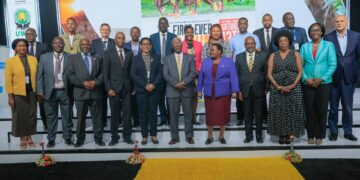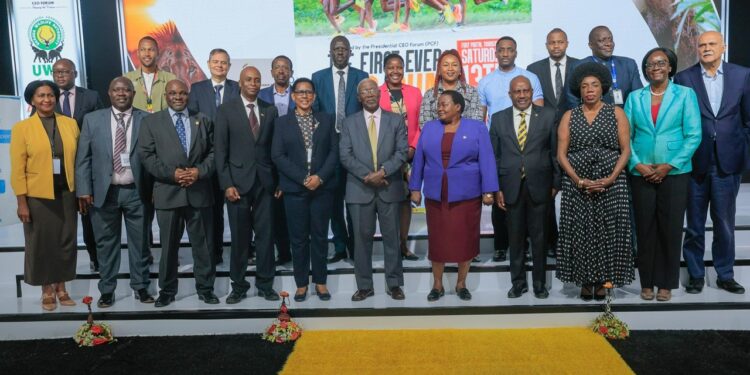Prime Minister Robinah Nabbanja has pledged to personally present six resolutions from Uganda’s tourism private sector to President Yoweri Museveni, following the conclusion of the 6th Bi-Annual Private Sector CEO Retreat in Fort Portal.
The three-day retreat brought together government leaders, private investors, and industry stakeholders to review tourism’s contribution to the economy while calling for urgent reforms in infrastructure, air connectivity, taxation, and Uganda’s global image.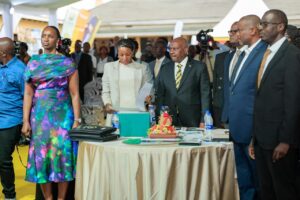 In her remarks, Nabbanja explained that the rehabilitation of the Mubende–Kyenjojo road had stalled after the contractor diverted initial funds to clear debts. She assured participants that government had since released an additional Shs50 billion to fast-track works, while in-house engineers had been tasked to ensure the road remains motorable.
In her remarks, Nabbanja explained that the rehabilitation of the Mubende–Kyenjojo road had stalled after the contractor diverted initial funds to clear debts. She assured participants that government had since released an additional Shs50 billion to fast-track works, while in-house engineers had been tasked to ensure the road remains motorable.
On air transport, Nabbanja acknowledged Kisoro’s geographical constraints but revealed that feasibility studies were underway for the Kabale–Nyamitanga route with African Development Bank support. She announced that a partner had committed to transform Mbarara into an international airport, while a Chinese investor had expressed interest in upgrading Kasese to international status.
“I will personally hand over the resolutions from this retreat to the President after Cabinet on Monday, one by one,” she emphasized.
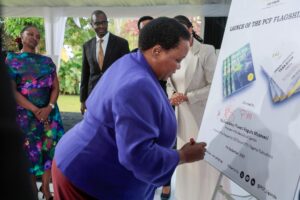
Tourism Minister Tom Butime hailed the retreat as a vital platform for reflection, pledging to work with the Prime Minister to ensure the resolutions reach the President. He noted that Cabinet had consistently prioritized the Fort Portal road, a lifeline for tourism in the region.
Butime celebrated the sector’s recovery, citing a 7.7% rise in international arrivals in 2024, the creation of 810,000 jobs, and record levels of domestic tourism. He credited the progress to infrastructure development, peace, security, private sector resilience, and community participation.
Highlighting cultural promotion, eco-tourism, adventure, and MICE events as growth drivers, Butime reaffirmed that the National Development Plan IV (NDP IV) would focus on infrastructure expansion, digital systems, skills training, and product diversification. With a target of USD 50 billion in earnings by 2040, he stressed that tourism is not just leisure but also a pillar of diplomacy, trade, and investment.
Delivering the keynote, Tourism Permanent Secretary Doreen Katusiime described the sector as a cornerstone of Uganda’s socio-economic transformation. She reported that in FY 2024/25, Uganda received 1.37 million international arrivals and 2.8 million domestic visitors, generating UGX 6.3 trillion in expenditure.
“This growth reflects strategic government investments in infrastructure and security, as well as strong collaboration with the private sector and development partners,” she said.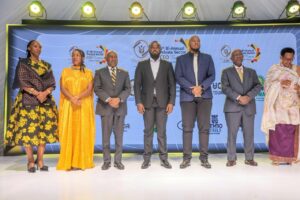
Private sector leaders presented candid proposals. Tour operator Byamukama Boniface urged President Museveni to personally tour Uganda’s national parks as a marketing tool, harmonize the 26 taxes burdening the industry, and fast-track the upgrading of Kisoro and Kasese into international airports to attract high-end travelers. He further called for urgent lion conservation efforts, warning the species faces extinction, and proposed establishing a tourism school in Fort Portal to serve surrounding protected areas.
The Karatunga mogul advocated for a regional branch of the Uganda Hotel and Tourism Training Institute to train more guides, demanded accountability in Uganda Tourism Board funds, and pushed for opening forest reserves in Karamoja for investment.
Forum chairperson Emmanuel Katongole led CEOs in tabling six key resolutions. These included:
Improving tourism infrastructure, especially the Fort Portal road, and constructing safe stopovers;
Expanding air connectivity in Kisoro and Kasese;
Allowing Uganda Airlines to focus on international routes while leaving domestic routes to private operators;
Developing the Lake Victoria circuit with reliable water and electricity;
Harmonizing the 26 existing taxes into a streamlined, investor-friendly system;
Establishing a robust media strategy to counter negative global travel advisories.
Stakeholders also called for stronger laws to curb misinformation on social media, regulations on noise pollution, and expanded freedoms that enable digital tourism promotion.
Participants agreed that achieving Uganda’s Vision 2040 target of USD 50 billion in tourism earnings will require urgent and coordinated action to address infrastructure gaps, air connectivity, taxation bottlenecks, and international image challenges.
